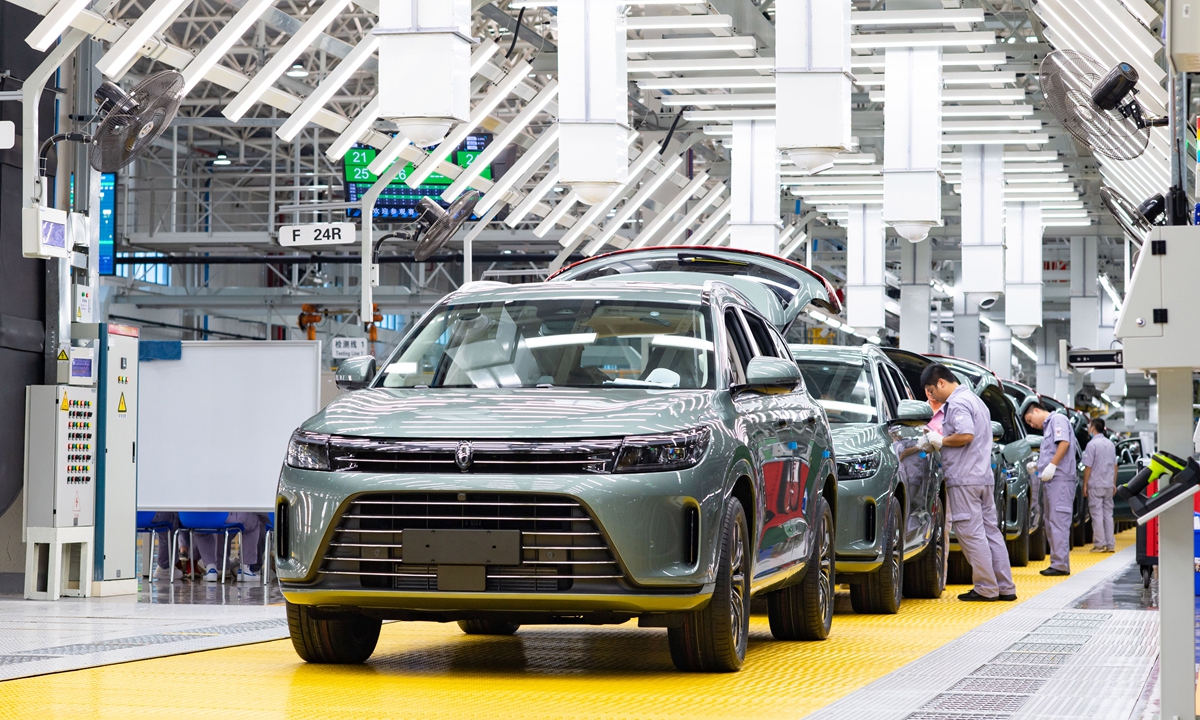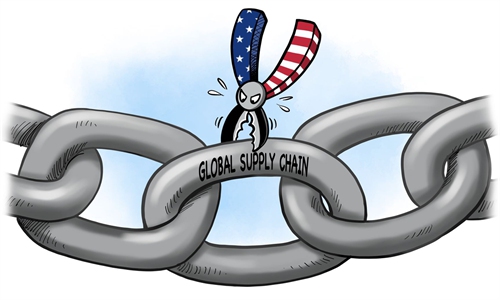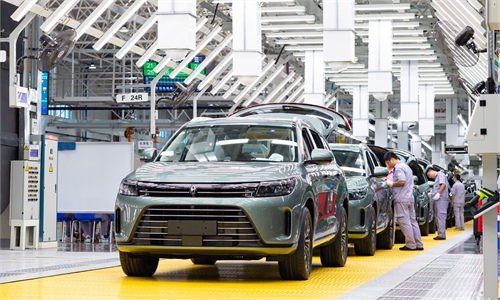China will integrate deeper into global industrial chains to counter anti-globalization trend: minister

An NEV manufacturing line in Southwest China's Chongqing Municipality Photo: VCG
China will integrate deeper into global supply chains, establish an open and cooperative system, and further open up its manufacturing sector to counter combined challenges that threaten the global recovery, a senior official reassured a group of foreign business representatives on Monday.
The remarks were made by Minister of Industry and Information Technology (MIIT) Jin Zhuanglong at the three-day China Development Forum (CDF) 2023 held in Beijing on its closing day on Monday.
"We will create a market-oriented, legalized and internationalized business environment, focus on ensuring foreign investment services, and encourage domestic enterprises to integrate more deeply into the global system and achieve common development," Jin said.
The official also called for global cooperation amid combined risks and challenges as well as globalization headwinds, saying there is an "urgent need" for all countries to join hands to respond rationally and maintain the security and stability of global supply chains.
A restoration of the global industrial chains was also the focus of discussion during the high-level dialogue forum, where participants refuted the "China decoupling" hype and called for cooperation and a return to the right path of globalization.
Amid a global crisis, multinational companies cannot do without China, and it is even more difficult for them to leave China through the implementation of "China decoupling" and build a new global value chain independently, Yi Xiaozhun, former vice minister of commerce and former deputy director-general of the World Trade Organization, told a panel at the forum.
Yi believes that countries should abandon their zero-sum mentality and return to the correct track of multilateral cooperation.
Ola Källenius, chairman of the board of Mercedes-Benz, stressed the multinational's commitment to China on Monday, saying the company "strongly advocates" in favor of both maintaining and expanding its international supply chain integration.
"Decoupling would have a negative impact on businesses and consumers," he said in a statement the company sent to the Global Times on Monday.
A strong presence of foreign firms at this year's CDF itself shows the attractiveness of the Chinese market to global capital, Wang Huiyao, founder and president of the Center for China and Globalization, told the Global Times on the sidelines of the event on Sunday.
The global economy's development is at a complicated, difficult stage. It is important to enhance confidence and stabilize expectations, in particular taking a longer vision, just like walking on a rainy day. If you look down you'll see mud but if you look forward you'll see a rainbow, Chinese Premier Li Qiang said during meetings with foreign representatives at the closing ceremony of the CDF 2023 on Monday night.
The Chinese economy has played the role of a stabilizer and source of power in the global economy. The Chinese economy will achieve growth of higher quality in the future, providing new drive for the world, and plenty of growth room for foreign firms, Li said.
China is the center of the global manufacturing value chains, whether it is labor-intensive goods or technology-intensive products, Xing Yuqing, professor of economics at the National Graduate Institute for Policy Studies in Tokyo, told the Global Times on the sidelines of the forum on Monday.
In 2022, China's total industrial added value and total value of goods trade both exceeded 40 trillion yuan ($5.81 trillion). The added value of the manufacturing industry accounts for nearly 30 percent of the global market, and the international market share of goods trade exports is close to 15 percent, Jin, the MIIT minister, disclosed on Monday.
Nevertheless, Xing warned that China's strength is built on a foundation of foreign core technologies, and the US-launched trade war against China may have a huge negative impact on the global value chain, with China as the manufacturing and assembly point and the US as the market, and it may affect China's position in the global supply chain.
The expert advised companies to take the opportunity of global industrial chain restructuring to invest overseas and accelerate their pace of internationalization. "China needs more of its own multinationals with their own brands and independent core technologies, so that they have more of a voice in the pattern of global value chains."



